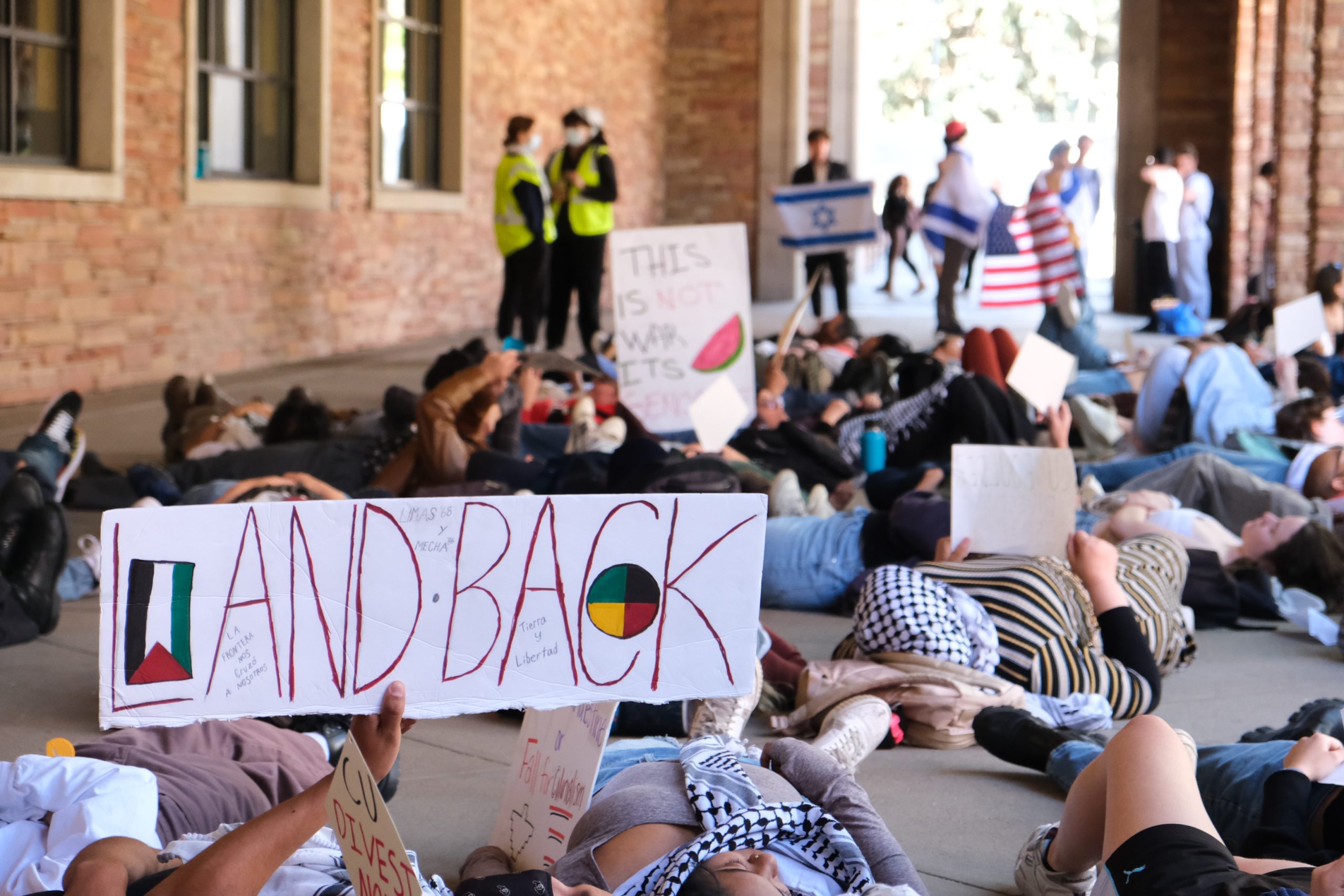
Pro-Palestinian protest at CU Boulder
Students at Colorado universities have joined the flurry of demonstrations sweeping the country since mid-April protesting the war in Gaza.
Organizers held a rally at CU Boulder’s Dalton Trumbo Fountain Court on Wednesday demanding the institution end investments tied to Israel. Roughly 50 people laid on their backs quietly at the edge of the courtyard and raised signs calling for action.
“This demonstration is not only to bring attention to the opinions of the student body, but also to demand divestment from the university and disclosure,” says Mari Rosenfeld, an organizer for Boulder Students for Justice in Palestine. “We want disclosure on all financial investments the university makes with their endowment. We also want divestment from both the Israeli economy and weapons manufacturers that participate in the apartheid state by sending weapons to Israel.”
Four police officers were at the event but did not engage with peaceful protestors. About 10 people stood in a group nearby with Israeli and American flags.
Similar demonstrations are occuring along the Front Range. As of May 1, protestors continued to occupy the Auraria Campus’ Tivoli Quad — a shared space between the University of Colorado Denver, Community College of Denver and Metropolitan State University (MSU) — for the sixth day in a row.
Multiple news outlets reported the encampment has drawn more than 200 people. There were 44 arrests April 26.
Students for a Democratic Society, who organized the Denver demonstration, listed a series of demands to the University of Colorado and MSU, including taking a public stance against the war and ending financial ties to Israel. Denverite reported the University of Colorado Denver has received nearly $3 million in contracts with Israel since 2016.
A group at Colorado State University also organized a nonviolent protest April 29 with similar demands.
“Our actions will reflect our commitment to justice and the moral imperatives our faculty have instilled and the university claims to uphold,” wrote CSU’s chapter of Students for Justice in Palestine in a letter to the university.
Demonstrations like these, which are responding to the worsening humanitarian crisis and increasing death toll from the war in Gaza, have occurred at college campuses around the country, resulting in hundreds of arrests. According to Al Jazeera, at least 34,356 Palestinians and 1,139 Israelis have been killed since Oct. 7.
“It’s personal to me. I’m Jewish, and it really hurts to see so much pain and death and have a genocide enacted in my name,” says Rosenfeld. “It’s very personal because I see all the time, and I’m getting told, that the state of Israel does everything it does for me as a Jew quote-unquote ‘for the safety of me,’ but all they are doing is really colonizing a land and genociding the Indigenous people.”
Wolf kills spark calls for lethal removal
Multiple rancher’s associations recently sent letters to Colorado Parks and Wildlife (CPW) requesting the lethal removal of wolves associated with livestock deaths in Grand and Jackson counties.
“The continued presence of these wolves poses a severe economic hardship for Grand County ranchers,” wrote the Middle Park Stockgrowers Association. “These recent attacks not only inflict financial losses but also threaten the viability of their operations.”
CPW has confirmed eight depredations, which is when a wolf kills or injures a domestic animal, in Grand and Jackson counties since the December 2023 reintroduction, all since April 2. According to multiple news outlets, stockgrowers associations in Larimer, Gunnison and Jackson counties also sent letters to the state.
In response to Middle Park’s letter, CPW Director Jeff Davis wrote that the wolf involved in these attacks is the male of a pair the agency believes is denning and expecting pups. Removing the male breeder would be “irresponsible management and potentially cause the den to fail, possibly resulting in the death of the presumed pups.”
The Wolf Restoration and Management Plan does not have a quantitative definition of what constitutes “chronic depredation” and rather outlines evaluations for attacks on a case-by-case basis. CPW recently launched a webpage with confirmed livestock injuries or deaths by wolves.
After one of the 10 reintroduced wolves was found dead, presumably by natural causes, April 18, the agency also confirmed at least one wolf made its way east of the Continental Divide and onto the Front Range, just north of Estes Park in Larimer County.
More news...
- Science tells us certain soil characteristics influence a plant’s growth, nutrient absorption and more. But what about flavor? A recent study from CU Boulder found soil microbes might influence the spiciness of mustard seeds.
- A new tool called HeatRisk will forecast potentially dangerous heat and give guidance for safety precautions. Released April 22 by the National Oceanic Atmospheric Administration and the Centers for Disease Control and Prevention, the tool is in response to more frequent and intense heat waves that are lasting longer, according to NOAA. There were nearly 500 heat-related emergency department visits in Colorado in 2022.
